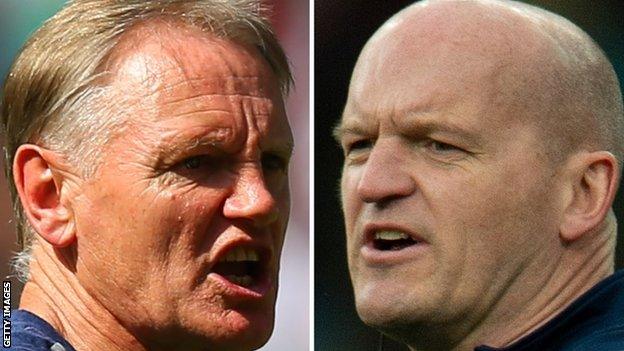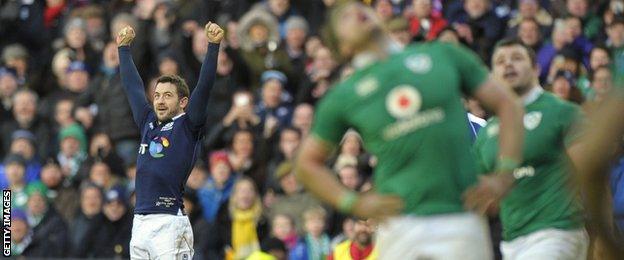Scotland: 'Gregor Townsend needs near-perfect repeat of 2017 to sink Ireland'
- Published

Ireland head coach Joe Schmidt and Scotland counterpart Gregor Townsend meet on Sunday
2019 Rugby World Cup Pool A: Ireland v Scotland |
|---|
Venue: International Stadium, Yokohama Date: Sunday, 22 September Kick-off: 08:45 BST |
Coverage: Full commentary on BBC Radio 5 Live, BBC Radio Scotland MW and BBC Radio Ulster; plus text commentary on the BBC Sport website and app. |
Scotland have taken a circuitous route to Yokohama, the venue for Sunday's World Cup pulse-quickener against Ireland, via training camps and games in Inverness and St Andrews, Largs and Portugal, Nice and Tbilisi, and another spell spent acclimatising in Nagasaki.
Days and weeks have passed in a blur. In their bubble, for the longest time, nothing else has mattered bar this game against the Irish. It's not that they're fed up with the preamble, says Tommy Seymour. It's just that they want to get going now. They're ready to play, they're "itching to get out there", says the wing.
"We're ready," said captain Stuart McInally on Saturday. Hooker Fraser Brown added that they are "underdogs but we're good to go".
The statistics, if they're relevant, kill the outsiders. In Gregor Townsend's time in charge, his team has played two and lost two against their rivals, scoring two tries and conceding seven. In Joe Schmidt's six games coaching Ireland against the Scots, he was won five, scoring 21 tries and conceding just nine.
Scotland have won only five of their last 10 World Cup games. They haven't beaten a Tier One nation in this competition since defeating Italy a dozen years ago. They haven't won a try count in this fixture since 2001.
Can Scots replicate 'special' 2017?
There's a template for victory, though. And it was a template that Townsend referred to on Friday and that Greig Laidlaw spoke about on Saturday.
It involves a bewildering amount of things going right and not a lot of things going wrong, but it's encapsulated in the victory over Ireland at Murrayfield in 2017, when the visitors had not long shaken up the world by beating the All Blacks.
That was a Test that showed Scotland at their best. They struck early with three clinical blows, two tries scored by Stuart Hogg when Ireland got done for pace in the outside channels and a third by way of a clever piece of opportunism off a line-out. The efficiency of their attack that day was extraordinary. They pretty much scored from every opportunity they created. They were ruthless, as they will need to be again on Sunday.
Ireland came back to lead in that game two years ago, but they were made to work like demons for everything they got. Scotland's defence was heroic. Occasionally chaotic and always belligerent, they had to make 242 tackles. Jonny Gray made 27 on his own. Of the top 10 tacklers on the day, nine of them were Scottish.
Even still, Ireland got themselves into a winning position with 17 minutes left. There was a moment around that point that sticks in the memory. It was the day in microcosm and it's the kind of thing that will have to be repeated if Scotland are to upset the odds in Yokohama.
It came as Ireland were pushing for the score that would extend their lead a little closer to the point of no return for the hosts. CJ Stander carried hard and was hit in the tackle by Gordon Reid and then Ryan Wilson. The Irish number eight folded and spilled the ball. Scotland went up the other end, won a penalty which Laidlaw put over. The momentum shifted in that moment. In terms of psychology, it was massive.
The win was special not just because it was against one of the best sides in the world but because it was so unlike Scotland to win that way. A lethal attack, a resolute defence, low error count, mental strength by the bucketload. In the two meetings of the nations since then Scotland haven't measured up in any of those categories.

Greig Laidlaw's penalties settled a thrilling back-and-forth contest in 2017
'It would be surprise if it doesn't go to the wire'
In big Tests in recent times, the concession of desperately soft points, and the inability to convert their own chances, has too often been the bane of this Scotland team's life, no more so than when playing Ireland.
In Dublin in 2018, Scotland butchered two glorious chances and gifted their hosts an easy seven points through a Jacob Stockdale intercept and helped them get another seven through an overthrown line-out that was gobbled up and punished to the max.
The gap at the end was 20 points but it all hinged on those moments, just as it did this year. Again, Ireland benefited from Scotland loading the gun and firing it into their own feet. Conor Murray's try came after an awful defensive mix-up between Seymour and Sean Maitland. Keith Earls' game-winning try came after Joey Carbery had somehow managed to run through the middle of Allan Dell and Rob Harley. That was a straightforward tackle that had to be made, but wasn't. Those two episodes added up to 12 avoidable points. Only nine points separated them in the end.
Scotland can easily turn that negative into a positive. Lower the error count and they might be in business. Their mood, quietly confident, can only have been buoyed by the injury reports coming out of the Ireland camp. They resisted a possible urge to punch the air when news emerged that Rob Kearney was out. Kearney, through his under-appreciated coverage of the back field, his nous in attack and his leadership, has always saved some excellence for the Scots.
Out, too, is Earls, scorer of three tries in his last four games against Scotland. That's a break for Townsend, too. Between the pair of them they have 170 international caps. Robbie Henshaw, a third normally-guaranteed starter, is also missing. Henshaw, with another 38 caps, is one of Ireland's key defenders. Carbery, who replaced Johnny Sexton at Murrayfield this season and steered the visitors home with his creativity, is a fourth absentee. Carbery would have been an important figure off the bench either at 10 or 15.
Their replacements - the swashbuckling Jordan Larmour, the classy Andrew Conway and the thoroughbred Garry Ringrose - illustrate the terrific depth in this Ireland squad, but those losses weaken the collective. The team is not as good and the bench is not as good. It might still be too much for Scotland, but it would be a surprise if this doesn't go to the wire.
Kindness and compliments with 'a very sharp edge'
All week the Scots have complimented the Irish and the Irish have complimented the Scots. The kindness will come to an end soon enough. It's only paper-thin at any rate. There is an edge here, sometimes a very sharp edge.
There have been multiple examples of bad blood between some of these players. Even in the most recent games, Peter O'Mahony took out Hogg and ended his Six Nations, while Hogg was the victim once again in the Pro14 final against Leinster. Kearney was the one who ended his day prematurely on that occasion.
In response, Ireland would cite the targeting of Sexton and Murray in the past. This is a game of verbal tit-for-tat that would go on for as long as the match itself if it ever got started. To add to the sense of anticipation on Sunday, some of the more combative characters all operate in the same area, the back-row, a place of infinite aggression.
All six operators are scavengers over ball, all six have track records in going to war in order to slow down the opposition on the floor. The beginning, the end and the in-between of Ireland's game is predicated on a rich supply of ball which is trucked up in phase after phase of brutality. They can play another way, but this how they've beaten Scotland recently. They've overpowered them.
If the Scots can slow the juggernaut then that's step one in repeating what they did in 2017. But only step one. All the other steps need to follow, all those other moments need to be won. They don't need to be perfect to win, but they need to be close to it. A furious Test awaits - compelling, no doubt, from first whistle to last.
